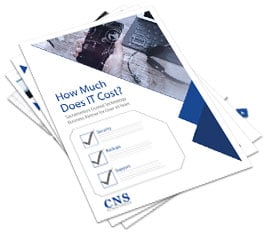Are you in the market for a new laptop?
With the rise of mobile technology, combined with increasing urban congestion, remote work is becoming an accepted norm in the workplace.
In fact, according to a 2018 study by the International Workplace Group, “70 percent of employees are working at least one day a week somewhere other than the office.”
So it’s no surprise that while sales of both desktop and tablet computers are set to fall in the coming years, Statistica forecasts global laptop sales to increase.
Of course, not all laptops are created equal, so what are the most important features you should look for when purchasing this crucial piece of business hardware?
1. Portability
The ability to take your computer wherever you go is central to the appeal of a laptop. A computer that causes shoulder strain when being carted around isn’t much use – so weight is an important consideration.
Modern laptops fall into several broad categories: ultra-portable (with a 9–13ʺ screen and weighing about 2.5 pounds), laptop (11–15ʺ screen and 3–6.5 pounds) and desktop replacement (15ʺ screen or larger and heavier than 4.5 pounds).
Generally speaking, weight equals computing power, so ask how much punch you require vs. how far and often you’ll have to carry it.
And be sure to check whether the listed weight includes the battery (which can add up to another pound).
2. Durability
With many workers constantly on the move, manufacturers have begun to take durability seriously as a selling point. Generally, metal cases offer more protection than plastic ones – though nothing beats a rubber case.
You’re also going to want to consider a spill-resistant keyboard if liquids are a factor in your workplace.
For less durable models, you might consider buying a shockproof case that attaches to the laptop or investing in a robust carry bag.
3. Storage
Laptops are available that offer between 128GB and 2TB of space. For those who frequently use larger files, such as videos and high-resolution images, more space is better. However, even 128GB is enough for about 60,000 photos, 19,000 songs, or 3.3 million documents.
If people in your business travel frequently, you might consider a laptop with a solid-state drive (SSD). Unlike traditional hard drives, SSDs don’t have any moving parts, which makes them quicker, more durable and resistant to overheating.
On the flip side, if speed isn’t vital, external hard drives are an increasingly affordable option, with 2TB expansion drives selling for less than $100 these days. They also offer increased flexibility, being able to plug into different computers.
4. Battery life
For those who use their laptop on the commute or in other locations that don’t have a convenient wall outlet, battery life is crucial – after all, without an unreliable battery, your laptop quickly becomes an expensive paperweight.
That said, while battery life is an important aspect of any laptop, it’s also a difficult beast to nail down because the same machine will last for different periods based on how it’s being used. Simply drafting up a report on a word processor will see a battery last a lot longer than watching videos on YouTube. And new batteries perform far better than older ones. Some new business laptops sail past the nine-hour mark, giving you a full day of work on a single charge.
5. Performance
Ultimately it all boils down to performance. However, this is also a question of your requirements. You can spend as much as ten thousand dollars on a laptop that displays video in 4K and packs the processing power to play the most advanced games on the market.
Most business laptops come in at a fraction of that price yet offer fast processors with integrated graphics cards that support multi-tabbed browsing and common office programs. In many cases, this is all you’ll need.
Of course, if you do work with large media files, frequently edit photos and videos, or want to play video games on your lunch break, you’d do well to select a laptop with superior graphics, memory, and RAM.
Realistically, laptops are mature devices, meaning it’s hard to get it wrong when making a purchase, but these tips will help you to get it right.





